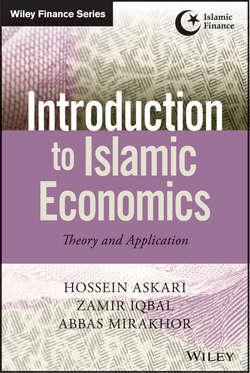Читать книгу Introduction to Islamic Economics - Mirakhor Abbas - Страница 10
На сайте Литреса книга снята с продажи.
Chapter 1
Economic Systems
Islamic Economics Paradigm
ОглавлениеIslam is a rules-based system with a prescribed method for humans and society to achieve material and nonmaterial progress and development grounded in rule compliance and effective institutions. The foundations of the Islamic economic system were laid down centuries ago in the Quran and practiced by the Prophet Muhammad in Medina during his brief time on this plane of existence. These rules laid down by the Almighty (swt) are at the foundation of the Islamic system and provide the required effective institutions. The institutional scaffolding of the Islamic economic system is thus formed by the rules of behavior defined by the Quran. As a result, the content and blueprint of Islamic economics is derived by: (1) extracting the rules that define an ideal Islamic economy and their economic implications from the Quran and the Sunnah (the teachings and the practice of the Prophet Muhammad [sawa]); (2) studying these institutions in the contemporary economy and determining the degree and extent of deviation between institutional scaffolding and that of the ideal Islamic economy; and (3) prescribing policy recommendations to bridge the gap between the two.
The Islamic economic system is a market-based system, where markets are seen as the best and most efficient mechanism for resource allocation (production and consumption). But efficiency of the market system must not be confused with markets as an ideology, whereby unfettered markets are seen as philosophy or the basis of the economic system, something to be revered, untouched, and placed on a pedestal. To be efficient, markets must have rules (such as information disclosure) to protect market participants (workers, producers, investors, and consumers) and must be supervised with strict rule enforcement. Private property that is legally acquired is held sacred in Islam, and property rights are fully protected. However, according to Islam, Allah (swt) is the Creator of all things on this earth and His creation has been given to humans of all generations in trust. Thus land and other natural resources must be developed in ways that benefit all humans of all generations equitably. It is imperative that the rights of the disabled and those of future generations are fully honored.
A major feature of the Almighty's rules, conveyed in the Quran and practiced by the Prophet (sawa), is justice. Thus the Islamic institutional scaffolding and the ideal Islamic economy exude justice. As a result, the promotion of social and human development on this plane of existence is founded on rules that promote justice. The Prophet (sawa) understood the essential objective of the message to encourage and insert justice in human societies as emphasized in the Quran. The Prophet (sawa) taught the responsibility of the individual, the collectivity, and the state. He particularly emphasized the equality of individuals before the law and that all rules that are incumbent on individuals and the collectivity must be more strictly observed by those in positions of authority, as illustrated by his famous saying: “Authority may survive disbelief but not injustice.” Insistence on justice became the hallmark of the institutional scaffolding of governance, a structure with full transparency and accountability. Rule compliance that embraces the pursuit of social justice is a requirement of each and every Muslim during every day of his or her life on this earth. Justice is essential in all endeavors, as the pursuit of justice leads to spiritual fulfillment and brings humans closer to their Creator. Rule compliance and justice cannot be compromised. In Islam, social and human development is multidimensional and goes well beyond the highest level of GDP and GDP per capita. Human spiritual pursuits on this earth cannot be compromised for material ends.
In Islam, conventionally measured GDP per capita and GDP growth are not society's only economic goals. There are overriding spiritual, moral, and human dimensions to all economic endeavors. Humans need bread to live but do not live by bread alone. The goal of progress and development is the overall well-being of humans and society. While this has been the goal in Islam, it began to be recognized through the work of Mahbub ul-Haq, Amartya Sen, and numerous other economists in conventional economics only in the late 1970s. Moreover, in Islam, institutions have been seen as an essential element and the foundation of achieving human and economic development. This idea became popular in conventional economics only about 30 or so years ago; it had been almost forgotten from the writings of Adam Smith with the emergence of neoclassical economics. Institutions are the formal and informal laws and rules that shape political and economic structures of society to reduce risk and increase trust. Risk reduction and trust enhancement in turn support economic progress and prosperity.12
12
For a detailed discussion of these points, see Mirakhor (2010).
